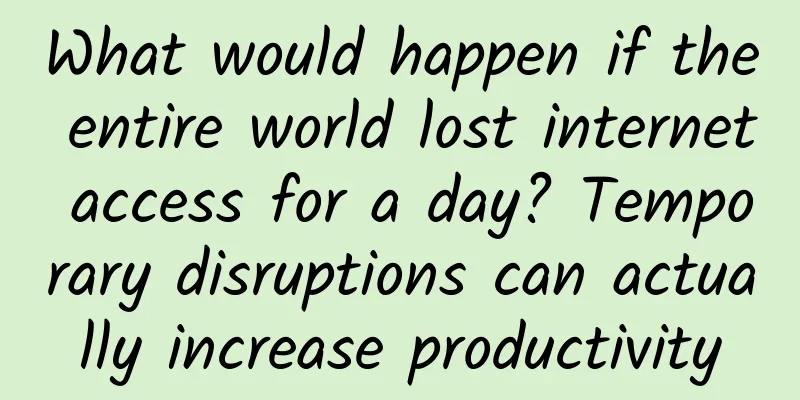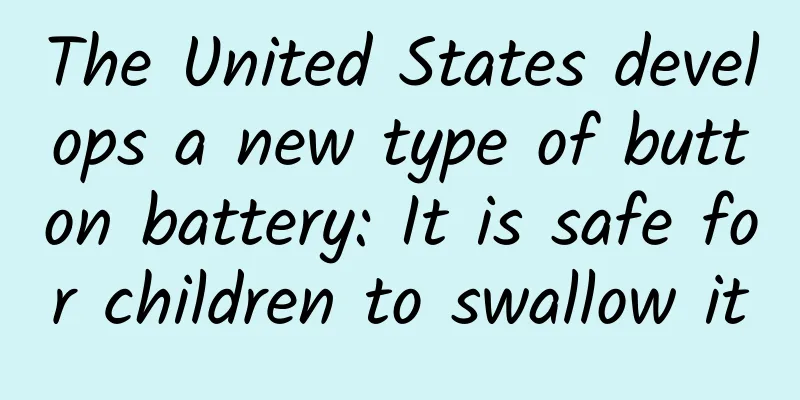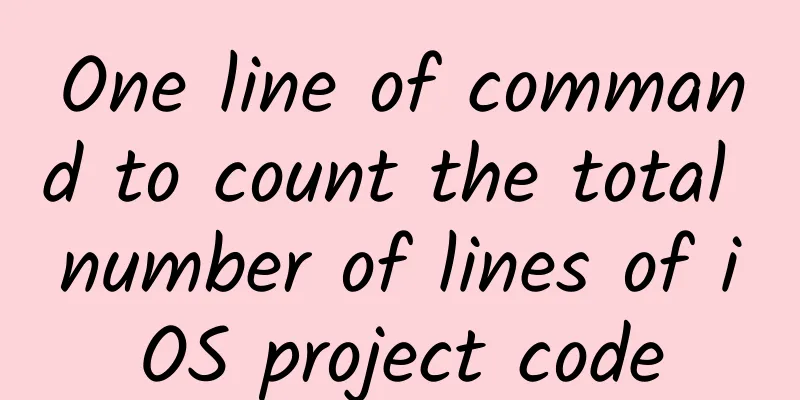What would happen if the entire world lost internet access for a day? Temporary disruptions can actually increase productivity

|
In 1995, less than 1% of the world's population used the Internet. Twenty years later, this number has exceeded 3.5 billion, almost half of the world's total population, and is still increasing at a rate of 10 people per second. According to statistics, about one-fifth of Americans say they are "almost always online", and 73% say they use it at least once a day. The situation in the UK is similar. A survey last year showed that nearly 90% of British adults said they had used the Internet in the past three months. Many people simply cannot imagine life without the Internet. Experts say that many people take the Internet for granted and never think about how it has penetrated every aspect of life, or what it would be like to be without it. But the Internet is not indestructible. In theory, there is the possibility of a long-term Internet outage across the country or the world. Hacker attacks, shutting down domain name servers, cutting submarine cables, etc. can all lead to such incidents. In 2008, serious network outages occurred in the Middle East, India and Southeast Asia due to the cutting of submarine cables or interference. The most devastating impact comes from outer space. For example, a large solar storm can paralyze satellites, power grids and computer systems. But most Internet outages don't last long. Internet service providers and equipment manufacturers have response plans and technicians to restore the network to normal. We are all used to living with the Internet at all times, and even a temporary interruption will cause some impact. However, the consequences of an Internet outage may be very different from what you think. First, the economic impact of a network outage may not be too severe. In 2008, the U.S. Department of Homeland Security made an estimate of the possible consequences of a network outage. Experts analyzed the economic impact of computer system and Internet outages in the United States after 2000. They studied the quarterly financial reports and overall economic data provided by 20 companies that claimed to have been severely affected and found that the impact of network outages on the economy was extremely small, at least when the network was disconnected for no more than four days. It turns out that a network outage only puts people behind in their work progress by a few days. When the network is restored, people still have to do the same things as before, but they are only two or three days late. In some cases, a temporary Internet outage may actually increase productivity. In another study, experts analyzed what happened when a company lost Internet access for more than four hours. They found that employees did not idle away from work, but took the opportunity to finish tasks that they normally did not have time to do, such as paperwork. The result of this is very beneficial to business. "We joke that if every company turned off their computers for a few hours every month and let people finish the work they had been procrastinating, it might improve overall economic performance," said the experts. The tourism industry will not be affected too much in the short term, as long as the outage does not exceed one day. Planes can fly without Internet access, and trains and buses can run smoothly. However, a long-term Internet outage will cause disruption to the logistics industry. Without the Internet, logistics companies will find it difficult to operate. Large-scale communications network outages may also have a serious impact on small businesses and blue-collar workers. In 1998, a satellite failure disabled 90% of the 500 billion pagers in the United States. A survey conducted the next day showed that people's reactions to the incident were clearly divided by class. People in the middle and upper classes who worked in management or professional positions did not think the incident caused a serious problem. But many self-employed blue-collar workers, such as plumbers and carpenters, relied entirely on pagers to find work and ended up being unemployed for several days. Single mothers who put their children in day care were also worried about the communication outage. It can be seen that people's reactions to network outages are likely to be different depending on their social status. However, disconnection from the Internet can have a great psychological impact on people, making them feel isolated and anxious. The main purpose of the Internet is to achieve interpersonal communication. We are used to being connected to others anytime and anywhere, otherwise we will feel uncomfortable. If some people forget to bring their mobile phones, they may even feel like they are "running naked", always worrying that they have taken the wrong road, or their car has broken down halfway, but they cannot call for help. History also proves this point. In 1975, a fire broke out at the New York Telephone Company, and telephone lines in parts of Manhattan were cut off for 23 consecutive days. After the lines were restored, researchers interviewed 190 residents, and four-fifths of them said they missed having a phone because they could keep in touch with friends and family. Two-thirds said they felt "isolated" and "restless." In addition, nearly three-quarters of people said it was easier to control their lives after the lines were repaired. "There is a view that without the Internet, people will be closer to friends and family, but this is not true," experts said. "Most Internet users actually prefer socializing." Stine Lomborg of the University of Copenhagen agrees. "Even if we don't have smartphones, it doesn't mean we'll go around talking to strangers. Being offline might increase our contact with others in certain situations, but overall it will still be frustrating. Even if it's just for one day, most people will find it scary." But this feeling is only temporary. The Internet outage may make people realize how important it is in their lives, but we will soon take it for granted. A short-term Internet outage will not change people's way of thinking. But even so, students still find it difficult to accept a weekend without the Internet. As a winner of Toutiao's Qingyun Plan and Baijiahao's Bai+ Plan, the 2019 Baidu Digital Author of the Year, the Baijiahao's Most Popular Author in the Technology Field, the 2019 Sogou Technology and Culture Author, and the 2021 Baijiahao Quarterly Influential Creator, he has won many awards, including the 2013 Sohu Best Industry Media Person, the 2015 China New Media Entrepreneurship Competition Beijing Third Place, the 2015 Guangmang Experience Award, the 2015 China New Media Entrepreneurship Competition Finals Third Place, and the 2018 Baidu Dynamic Annual Powerful Celebrity. |
Recommend
Baidu Information Flow Delivery Manual
Baidu Information Flow is one of the main channel...
In-depth analysis | How did the 400 million yuan worth of advertising and content of "The Debaters" come together so perfectly?
There is a variety show that inserts advertisemen...
What exactly is "Rakshasa Sea City" about?
Although "Rakshasa Sea City" is bizarre...
The dead are like dodo birds, but there is still a glimmer of hope for resurrection
The national emblem of the Republic of Mauritius ...
The deep relationship between flash vendors and iOS system upgrades, ASO's current problem analysis!
Recently, the iOS market has been relatively calm...
How to make money by watching video ads on YouTube?
How to make money by watching video ads on YouTub...
Baidu's multiple apps have vulnerabilities, Wuyun claims it can remotely control Android devices
On October 28, the Wuyun vulnerability platform r...
Who is your best friend? Green Peacock: Ox!
Produced by: Science Popularization China Author:...
WM Motor is caught in a cancellation storm, with a product cancellation rate of up to 30%
WM Motor, known as the "price butcher" ...
Lovely owls? It turns out this mysterious species is not simple!
Owls have fascinated humans for thousands of year...
[Live] Wang Jian, Technical Director of iFlytek Open Platform: How to create a natural human-computer interaction experience
[51CTO.com original article] Since the birth of c...
If you don’t want your bones to become more and more brittle, you must eat less of these foods!
This article was reviewed by: Xie Xinhui, Jixi Ji...
After the COVID-19 test turns negative, should we replace toothbrushes, lipsticks and other daily necessities? The December scientific rumor list is released. Let's hear what the experts say.
1. "After the COVID-19 test turns negative, ...









